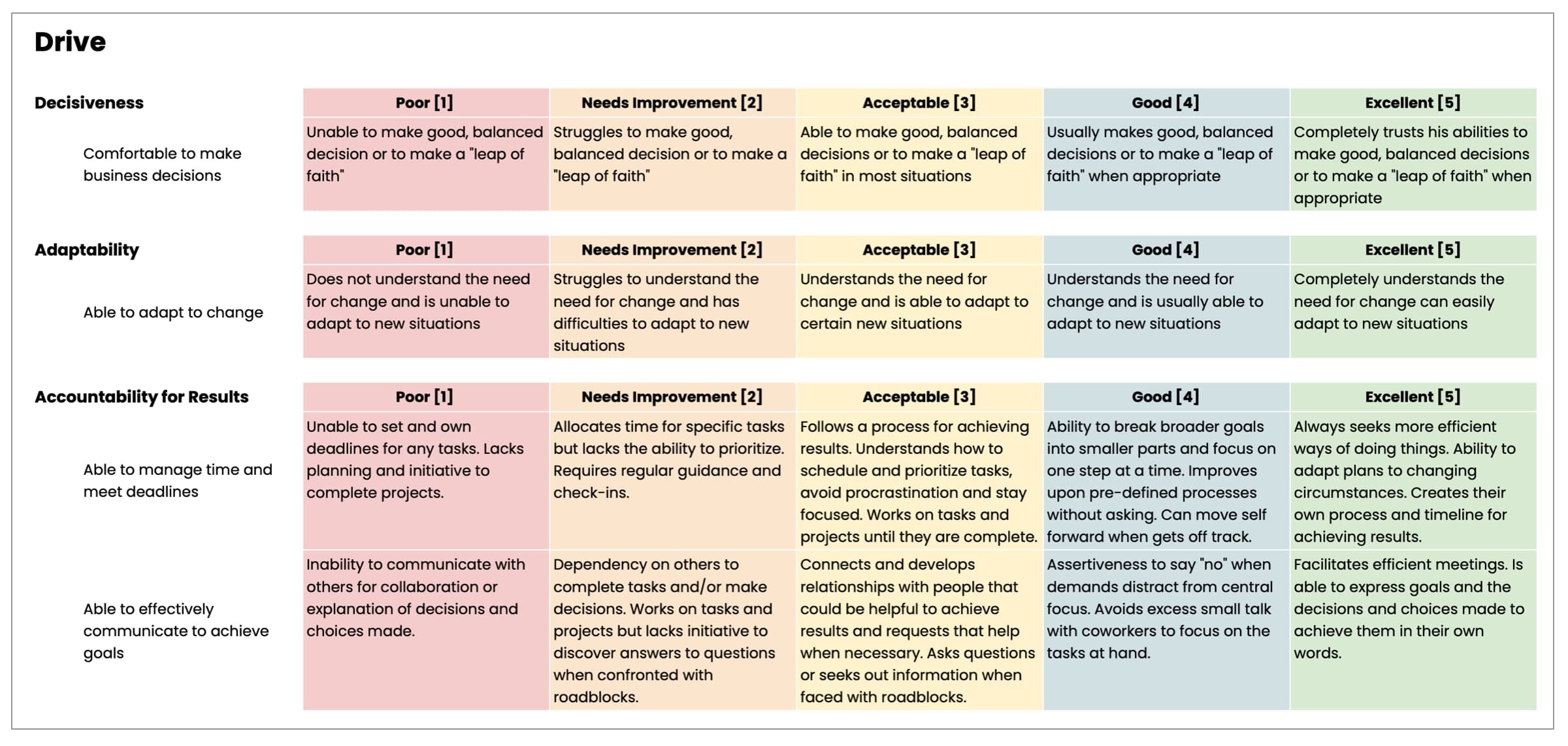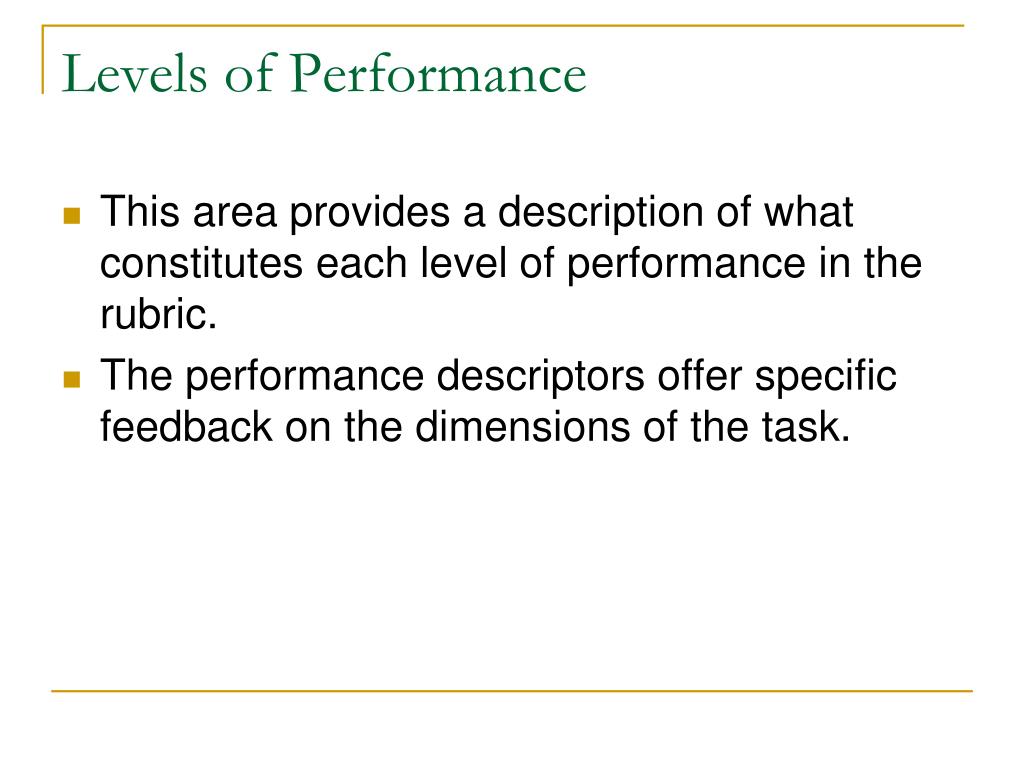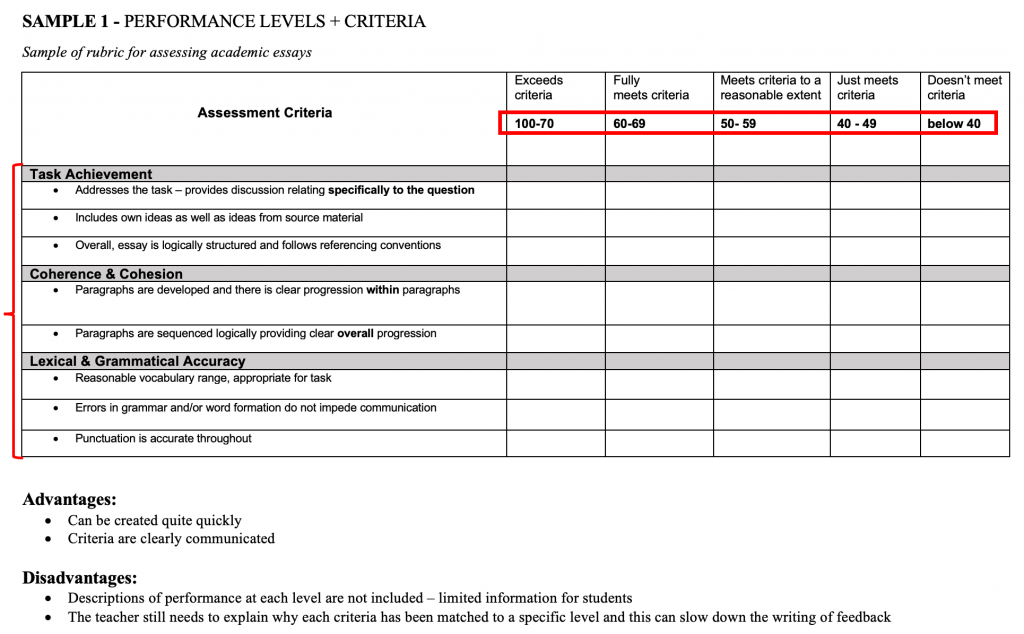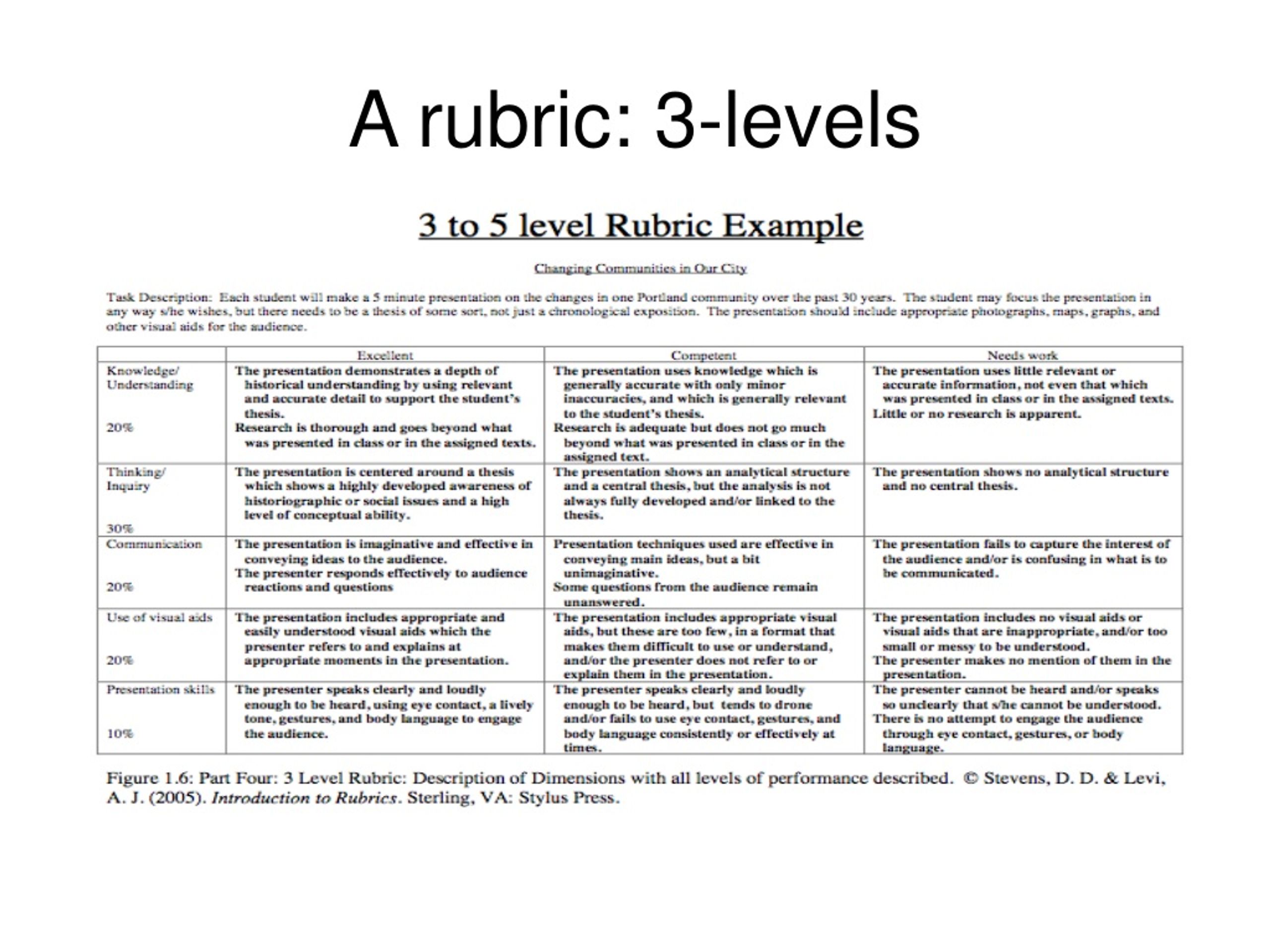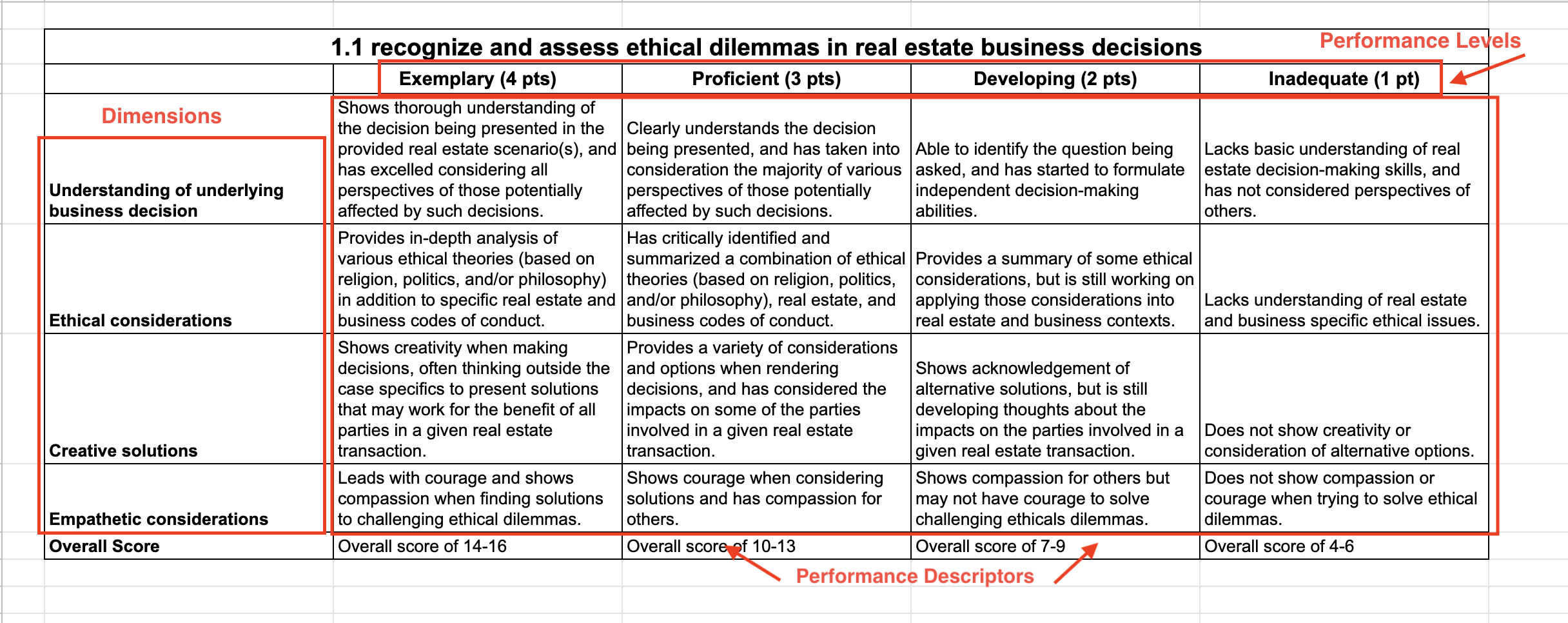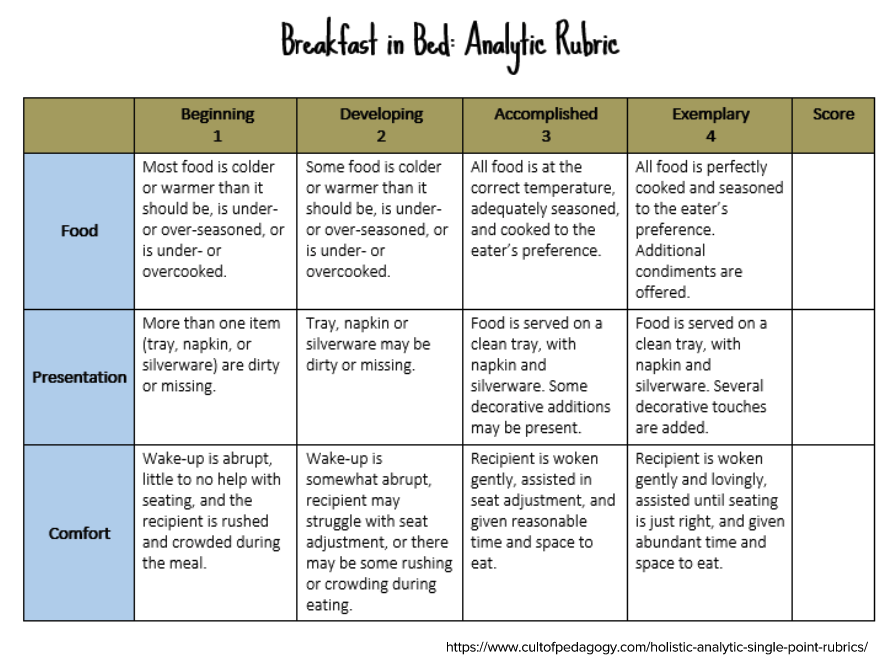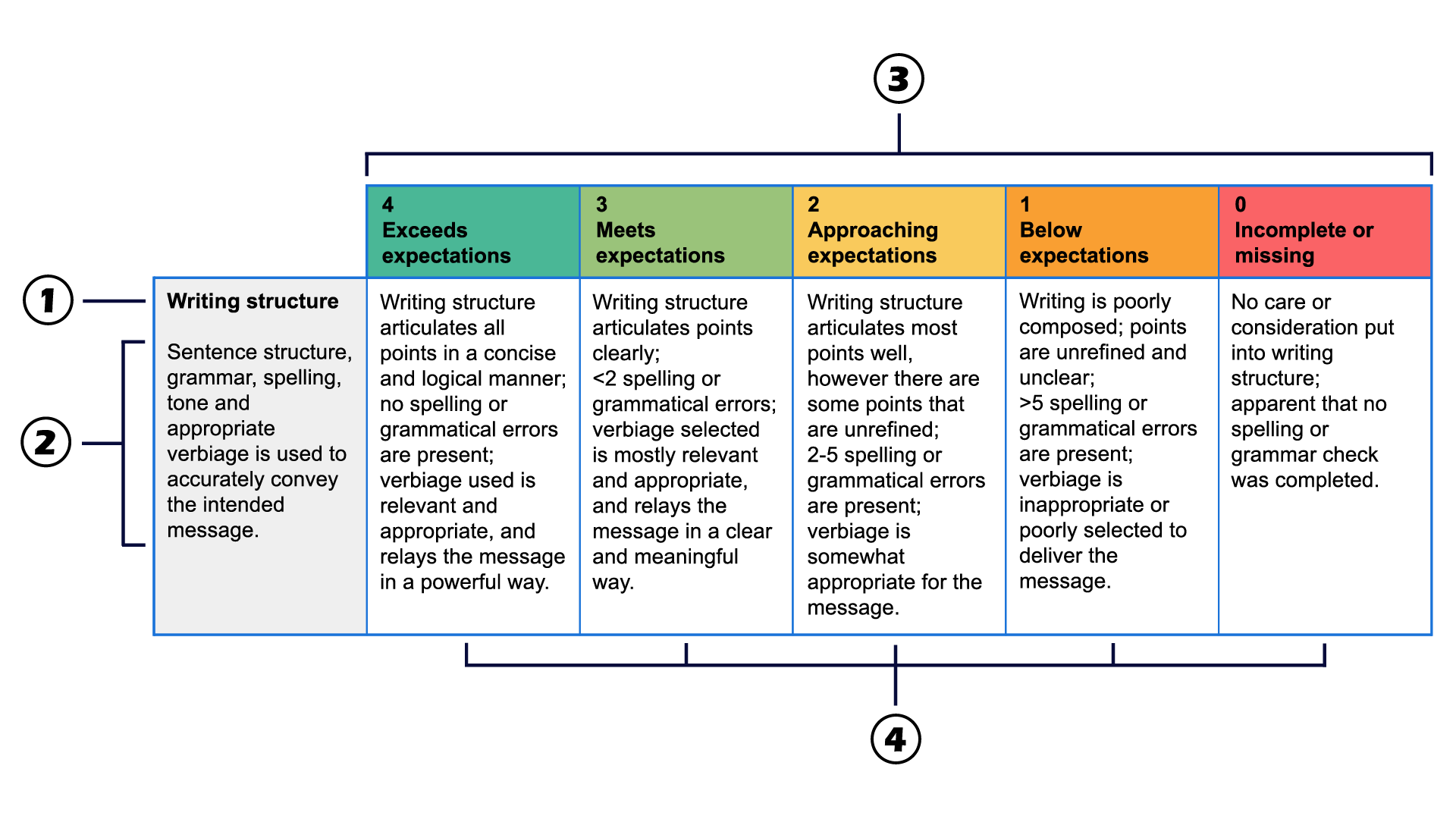Levels Of Performance In A Rubric - An analytic rubric specifies at least two characteristics to be assessed at each performance level and. Apply the dimensions and descriptions from stages 2 and 3 to the final form of the rubric, using a grid format. Rubrics allow reliable scoring to the degree that evaluative language (“excellent,” “poor”) and comparative language (“better than,” “worse. The rubric for a particular level describes the performance outcome at that level, and each subsequent rubric describes the quality of. The third aspect of a rubric design is the levels of performance and the labels for each level in the rubric.
An analytic rubric specifies at least two characteristics to be assessed at each performance level and. The rubric for a particular level describes the performance outcome at that level, and each subsequent rubric describes the quality of. Rubrics allow reliable scoring to the degree that evaluative language (“excellent,” “poor”) and comparative language (“better than,” “worse. The third aspect of a rubric design is the levels of performance and the labels for each level in the rubric. Apply the dimensions and descriptions from stages 2 and 3 to the final form of the rubric, using a grid format.
Rubrics allow reliable scoring to the degree that evaluative language (“excellent,” “poor”) and comparative language (“better than,” “worse. The rubric for a particular level describes the performance outcome at that level, and each subsequent rubric describes the quality of. Apply the dimensions and descriptions from stages 2 and 3 to the final form of the rubric, using a grid format. The third aspect of a rubric design is the levels of performance and the labels for each level in the rubric. An analytic rubric specifies at least two characteristics to be assessed at each performance level and.
Conduct Assessment Unit Standard at Margaret Cass blog
An analytic rubric specifies at least two characteristics to be assessed at each performance level and. The third aspect of a rubric design is the levels of performance and the labels for each level in the rubric. The rubric for a particular level describes the performance outcome at that level, and each subsequent rubric describes the quality of. Apply the.
PPT Assessment Rubrics PowerPoint Presentation, free download ID
Rubrics allow reliable scoring to the degree that evaluative language (“excellent,” “poor”) and comparative language (“better than,” “worse. An analytic rubric specifies at least two characteristics to be assessed at each performance level and. The rubric for a particular level describes the performance outcome at that level, and each subsequent rubric describes the quality of. The third aspect of a.
Rubrics Educational Development and Quality
An analytic rubric specifies at least two characteristics to be assessed at each performance level and. Rubrics allow reliable scoring to the degree that evaluative language (“excellent,” “poor”) and comparative language (“better than,” “worse. The rubric for a particular level describes the performance outcome at that level, and each subsequent rubric describes the quality of. The third aspect of a.
PPT Rubrics A powerful assessment tool for you, your students & your
The third aspect of a rubric design is the levels of performance and the labels for each level in the rubric. The rubric for a particular level describes the performance outcome at that level, and each subsequent rubric describes the quality of. Rubrics allow reliable scoring to the degree that evaluative language (“excellent,” “poor”) and comparative language (“better than,” “worse..
Rubric Guidelines Pepperdine Community
An analytic rubric specifies at least two characteristics to be assessed at each performance level and. Apply the dimensions and descriptions from stages 2 and 3 to the final form of the rubric, using a grid format. The third aspect of a rubric design is the levels of performance and the labels for each level in the rubric. Rubrics allow.
A Fresh Look at Rubrics and Norming Marco Learning
An analytic rubric specifies at least two characteristics to be assessed at each performance level and. The rubric for a particular level describes the performance outcome at that level, and each subsequent rubric describes the quality of. Apply the dimensions and descriptions from stages 2 and 3 to the final form of the rubric, using a grid format. The third.
Using Rubrics in Project Work Terry Rhodes Institute
The rubric for a particular level describes the performance outcome at that level, and each subsequent rubric describes the quality of. Rubrics allow reliable scoring to the degree that evaluative language (“excellent,” “poor”) and comparative language (“better than,” “worse. An analytic rubric specifies at least two characteristics to be assessed at each performance level and. Apply the dimensions and descriptions.
Media Credits Rethinking Assessment Strategies for Online Learning
The third aspect of a rubric design is the levels of performance and the labels for each level in the rubric. Apply the dimensions and descriptions from stages 2 and 3 to the final form of the rubric, using a grid format. The rubric for a particular level describes the performance outcome at that level, and each subsequent rubric describes.
Performance Rubric — The Shed
The rubric for a particular level describes the performance outcome at that level, and each subsequent rubric describes the quality of. Apply the dimensions and descriptions from stages 2 and 3 to the final form of the rubric, using a grid format. Rubrics allow reliable scoring to the degree that evaluative language (“excellent,” “poor”) and comparative language (“better than,” “worse..
Authentic Assessment. ppt download
An analytic rubric specifies at least two characteristics to be assessed at each performance level and. The rubric for a particular level describes the performance outcome at that level, and each subsequent rubric describes the quality of. Rubrics allow reliable scoring to the degree that evaluative language (“excellent,” “poor”) and comparative language (“better than,” “worse. Apply the dimensions and descriptions.
The Third Aspect Of A Rubric Design Is The Levels Of Performance And The Labels For Each Level In The Rubric.
Apply the dimensions and descriptions from stages 2 and 3 to the final form of the rubric, using a grid format. Rubrics allow reliable scoring to the degree that evaluative language (“excellent,” “poor”) and comparative language (“better than,” “worse. The rubric for a particular level describes the performance outcome at that level, and each subsequent rubric describes the quality of. An analytic rubric specifies at least two characteristics to be assessed at each performance level and.
